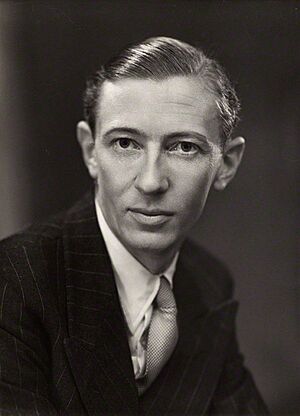Robert Carr facts for kids
Quick facts for kids
The Lord Carr of Hadley
|
|||||||||||||||||||||||||||||||||||
|---|---|---|---|---|---|---|---|---|---|---|---|---|---|---|---|---|---|---|---|---|---|---|---|---|---|---|---|---|---|---|---|---|---|---|---|

Formal portrait, 1951
|
|||||||||||||||||||||||||||||||||||
| Shadow Chancellor of the Exchequer | |||||||||||||||||||||||||||||||||||
| In office 4 March 1974 – 11 February 1975 |
|||||||||||||||||||||||||||||||||||
| Leader | Edward Heath | ||||||||||||||||||||||||||||||||||
| Preceded by | Denis Healey | ||||||||||||||||||||||||||||||||||
| Succeeded by | Geoffrey Howe | ||||||||||||||||||||||||||||||||||
|
|||||||||||||||||||||||||||||||||||
|
|||||||||||||||||||||||||||||||||||
| Personal details | |||||||||||||||||||||||||||||||||||
| Born |
Leonard Robert Carr
11 November 1916 North Finchley, Middlesex, England |
||||||||||||||||||||||||||||||||||
| Died | 17 February 2012 (aged 95) Alderley Edge, Cheshire, England |
||||||||||||||||||||||||||||||||||
| Political party | Conservative | ||||||||||||||||||||||||||||||||||
| Spouse |
Joan Twining
(m. 1943) |
||||||||||||||||||||||||||||||||||
| Children | 3 | ||||||||||||||||||||||||||||||||||
| Education | Westminster School | ||||||||||||||||||||||||||||||||||
| Alma mater | Gonville and Caius College, Cambridge | ||||||||||||||||||||||||||||||||||
Leonard Robert Carr, Baron Carr of Hadley (born November 11, 1916 – died February 17, 2012) was an important British politician. He was a member of the Conservative Party. He held a very important job called Home Secretary from 1972 to 1974. This role is in charge of law and order in the country. He was also a Member of Parliament (MP) for 26 years. Later, he became a member of the House of Lords, which is part of the UK Parliament.
Contents
Robert Carr's Early Life and Education
Leonard Robert Carr was born in North Finchley, England, on November 11, 1916. He went to a famous school called Westminster School. After that, he studied Natural Sciences at Gonville and Caius College, Cambridge University. He finished his studies in 1938.
After university, he used his knowledge of metallurgy (the science of metals) at his family's business, John Dale & Co. This company made metal parts for machines. During World War II, his company helped build parts for Lancaster bombers, which were important airplanes used in the war.
In 1943, Robert Carr married Joan Twining. They had three children: a son and two daughters. Sadly, their son, David, passed away in a traffic accident in 1965.
Robert Carr's Political Journey
Robert Carr started his political career by trying to become a Conservative candidate in 1950. He was then elected as a Member of Parliament (MP) for Mitcham in 1950. He served as an MP for this area until 1974. After that, he became the MP for Carshalton.
From 1951 to 1955, he worked as a special assistant, called a parliamentary private secretary, to Anthony Eden. Anthony Eden later became the Prime Minister. After Eden became Prime Minister, Robert Carr worked as a parliamentary secretary for the labour ministry.
Important Roles in Government
Robert Carr supported the European Economic Community, which was a group of European countries working together. When Edward Heath became Prime Minister in 1970, Robert Carr was made Secretary of State for Employment. In this role, he was responsible for a new law called the Industrial Relations Act 1971.
This law aimed to update how workers and businesses dealt with each other. It introduced new rules for workers, including compensation if they were unfairly dismissed from their jobs. However, it also limited the power of trade unions to go on strike. This law was not popular with trade unions. Their actions led to a difficult time for the country, known as the three-day week. This period eventually led to the government losing power.
In 1972, Robert Carr briefly served as Lord President of the Council. Then, he became Home Secretary after the previous person in that role resigned. After Edward Heath lost the first round of the 1975 Conservative Party leadership election, he asked Robert Carr to help lead the party until a new leader was chosen.
The new leader, Margaret Thatcher, met with Robert Carr. She later wrote in her memories that she understood why he might not want to work under her, as he had been very close to Edward Heath. Robert Carr said he would only accept the job of Shadow Foreign Secretary. However, Margaret Thatcher chose someone else for that role. Robert Carr then decided to leave the shadow cabinet.
In 1975, Robert Carr helped start a group called the Tory Reform Group.
Life After Politics
In 1976, Robert Carr was given a special title and became a life peer. This meant he could be a member of the House of Lords for the rest of his life. His full title became Baron Carr of Hadley.
After leaving frontline politics, he worked for several large companies. He was on the board of Cadbury Schweppes and was the chairman of Prudential Assurance from 1980 to 1985. He also worked for Securicor. From 1985 to 1986, he was the president of the Surrey County Cricket Club.
Robert Carr passed away on February 17, 2012, at the age of 95. He died from a lung infection called bronchopneumonia in Alderley Edge, England. He was buried in the graveyard of St. Peter's Church in Farmington. He was survived by his wife, Joan, and his two daughters.
 | May Edward Chinn |
 | Rebecca Cole |
 | Alexa Canady |
 | Dorothy Lavinia Brown |

